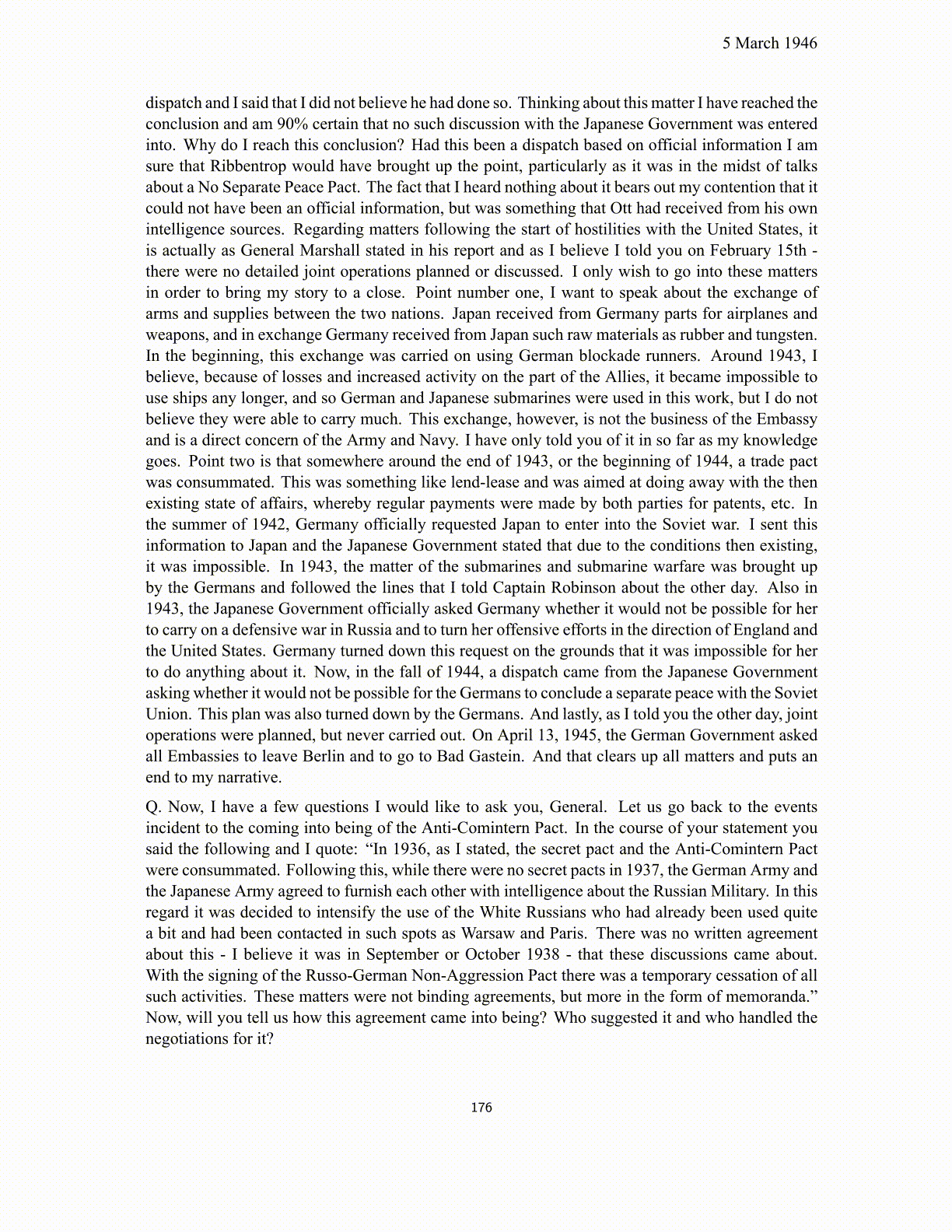
5 March 1946 dispatch and I said that I did not believe he had done so. Thinking about this matter I have reached the conclusion and am 90% certain that no such discussion with the Japanese Government was entered into. Why do I reach this conclusion? Had this been a dispatch based on official information I am sure that Ribbentrop would have brought up the point, particularly as it was in the midst of talks about a No Separate Peace Pact. The fact that I heard nothing about it bears out my contention that it could not have been an official information, but was something that Ott had received from his own intelligence sources. Regarding matters following the start of hostilities with the United States, it is actually as General Marshall stated in his report and as I believe I told you on February 15th - there were no detailed joint operations planned or discussed. I only wish to go into these matters in order to bring my story to a close. Point number one, I want to speak about the exchange of arms and supplies between the two nations. Japan received from Germany parts for airplanes and weapons, and in exchange Germany received from Japan such raw materials as rubber and tungsten. In the beginning, this exchange was carried on using German blockade runners. Around 1943, I believe, because of losses and increased activity on the part of the Allies, it became impossible to use ships any longer, and so German and Japanese submarines were used in this work, but I do not believe they were able to carry much. This exchange, however, is not the business of the Embassy and is a direct concern of the Army and Navy. I have only told you of it in so far as my knowledge goes. Point two is that somewhere around the end of 1943, or the beginning of 1944, a trade pact was consummated. This was something like lend-lease and was aimed at doing away with the then existing state of affairs, whereby regular payments were made by both parties for patents, etc. In the summer of 1942, Germany officially requested Japan to enter into the Soviet war. I sent this information to Japan and the Japanese Government stated that due to the conditions then existing, it was impossible. In 1943, the matter of the submarines and submarine warfare was brought up by the Germans and followed the lines that I told Captain Robinson about the other day. Also in 1943, the Japanese Government officially asked Germany whether it would not be possible for her to carry on a defensive war in Russia and to turn her offensive efforts in the direction of England and the United States. Germany turned down this request on the grounds that it was impossible for her to do anything about it. Now, in the fall of 1944, a dispatch came from the Japanese Government asking whether it would not be possible for the Germans to conclude a separate peace with the Soviet Union. This plan was also turned down by the Germans. And lastly, as I told you the other day, joint operations were planned, but never carried out. On April 13, 1945, the German Government asked all Embassies to leave Berlin and to go to Bad Gastein. And that clears up all matters and puts an end to my narrative. Q. Now, I have a few questions I would like to ask you, General. Let us go back to the events incident to the coming into being of the Anti-Comintern Pact. In the course of your statement you said the following and I quote: “In 1936, as I stated, the secret pact and the Anti-Comintern Pact were consummated. Following this, while there were no secret pacts in 1937, the German Army and the Japanese Army agreed to furnish each other with intelligence about the Russian Military. In this regard it was decided to intensify the use of the White Russians who had already been used quite a bit and had been contacted in such spots as Warsaw and Paris. There was no written agreement about this - I believe it was in September or October 1938 - that these discussions came about. With the signing of the Russo-German Non-Aggression Pact there was a temporary cessation of all such activities. These matters were not binding agreements, but more in the form of memoranda.” Now, will you tell us how this agreement came into being? Who suggested it and who handled the negotiations for it? 176